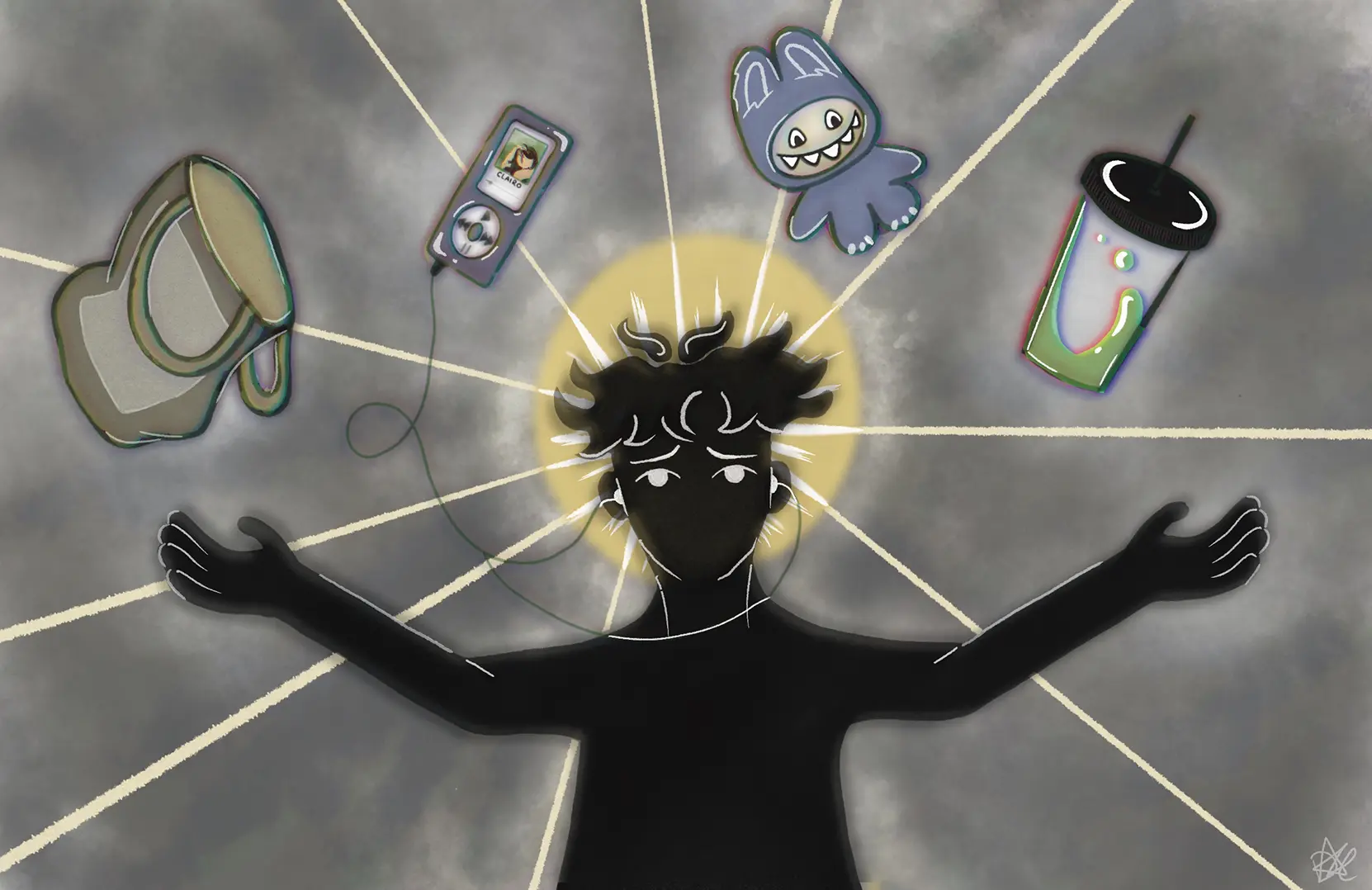How artificial status is performed.
Forrester Toews
Illustration by Dallon Costello
As you walk to your 200-level humanities class in Building 6, you pass Starbucks. Near the fairly expensive cafe, you notice someone that you’ve seen many times before with a different face. His tote bag has a different print, his baggy jeans have a different wash, and a different type of bag charm. While he may not be holding any of Judith Butler or Slavoj Zizek’s works, he does have the same item in his inventory that he always does; an iced matcha. We’ve all seen him before; listening to music with his wired headphones, and looping another Labubu onto his Fjallraven Kanken backpack. He is known as the Performative Male.
What do we mean when we label others as being performative? If you want to go the academic route, it has a couple definitions. Erving Goffman, someone who most MacEwan students learn about in humanities classes, described social interactions as being similar to theatrical productions. The front stage is where humans perform for the audience, so that they are perceived a certain way. The back stage is the true self, where people act more true to themselves in front of those who are close to them. In feminist theory, specifically coined by Judith Butler, gender is said to be an act — a verb — rather than a trait or a characteristic. It is not something biological, rather a performance.
“Collectible-lined-shelves mask the places where paintings and photographs once hung, as our landlords won’t let us put holes in the walls. Mortgage payments are replaced by monthly rent fees, as we’ll never afford real property.”
Performativity requires someone to behave, dress, and talk in a way that may not be true to themselves. Sure, the same can be said about the performative male. He follows trends, and performs in a way that he thinks is attractive to others. But does he do it only for the chance at companionship? Or is his bedazzled Labubu trying to signal something more?
During most of human history, status has primarily been attributed to a person’s ability, even if that person’s ability is just being wealthy. Status could come from being good at a sport, being an acclaimed writer, or even just being the best Pokemon player in grade school. Pokemon, Labubus, and other materialistic plastic garbage — like my own Magic the Gathering collection — simulate the status of wealth. By buying and selling archived clothing on Grailed, or reselling trading cards on other secondary markets, hobbies become side hustles and displays of wealth. It’s akin to comparing a dollar bill to the shiny objects found in a crow’s nest. Most of our hobbies are like this, and Labubus are only ridiculed due to their absurdity and foreign origins.
In a similar sense, an artificial “high-class” culture is found with the iced matcha, listening to Clairo on wired headphones, and reading feminist literature in public. It’s not so different from your own Letterboxd lists of art films, and your iced latte from Deville that you use to pregame your classes.
The performative male isn’t much different than us. He performs to appear intelligent in his array of “high class” interests, and subtly postures in an effort to gain status. His iced matcha and archived fashion is his own version of a glass of fine wine and a tailored 5-piece suit. We attain these artificial statuses within our own interest groups, in the absence of real tangible wealth. Collectible-lined-shelves mask the places where paintings and photographs once hung, as our landlords won’t let us put holes in the walls. Mortgage payments are replaced by monthly rent fees, as we’ll never afford real property. Material wealth that was once found in property ownership has been replaced by whatever trinkets we find “cool.” Lower paychecks mean we can’t afford a brand new car, but there’s just enough money to pay for expensive drinks that give us the comfort of simulated wealth.
In this absence of wealth comes a lack of time. Skills used to be developed in hobbies that require time and effort. Nowadays, we often don’t have time to try. Instead, skill means that we can find the most niche music, or own the rarest Pokemon cards, or obtain the most limited Chrome Hearts pieces. We all want to appear knowledgeable in our own niche high cultures. We are all performative.
I know that the performative male is much more annoying than the rest of us. But before we judge, try and see him as a reflection of our most performative selves. I urge you to pick up a hobby that isn’t fundamentally a product. One that requires dedication, commitment, and discipline. If you already have one, keep hoping for the future where you can own a home, and work that high-paying job you’ve always wanted. Hopefully, you won’t have to perform for much longer.





0 Comments